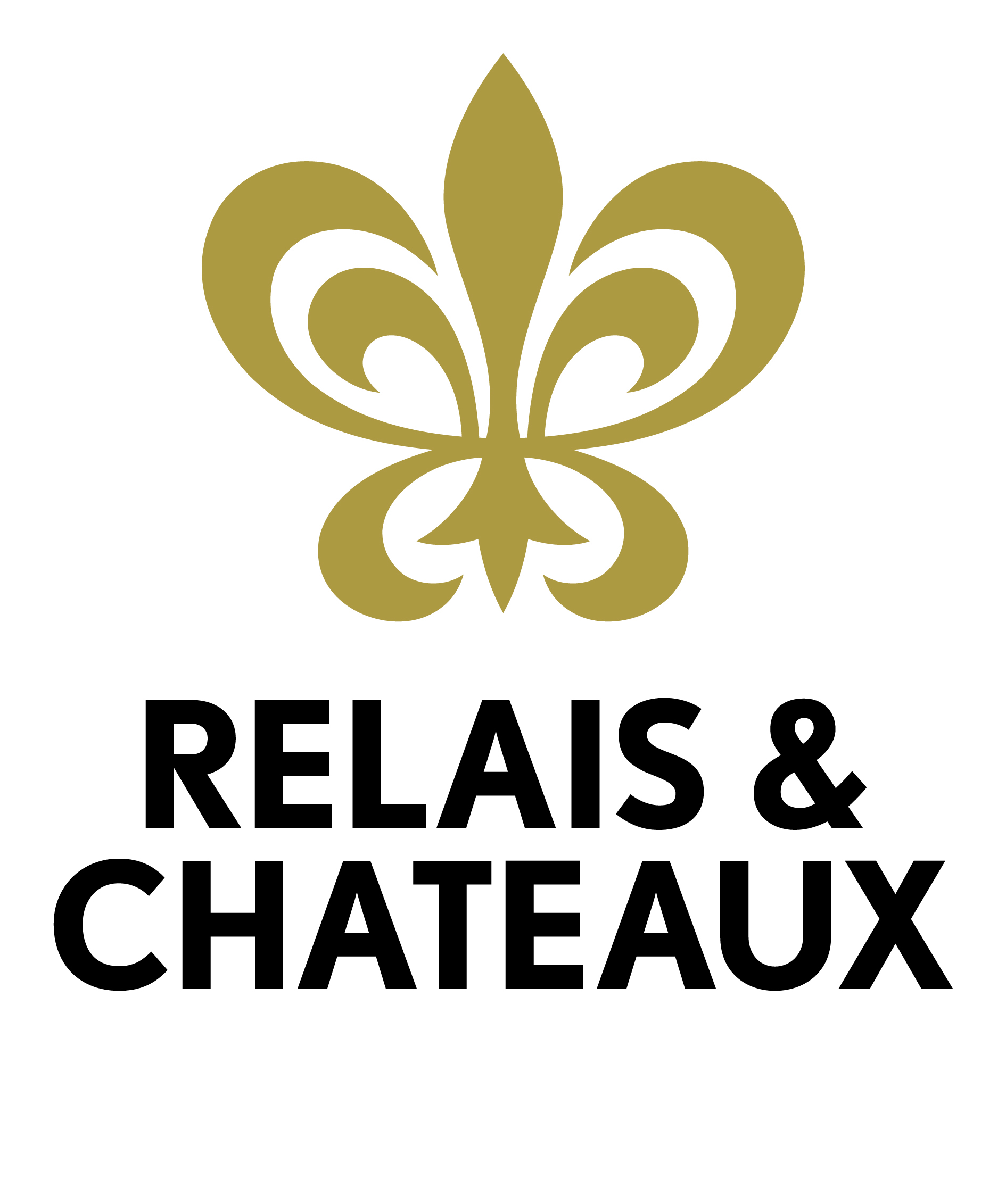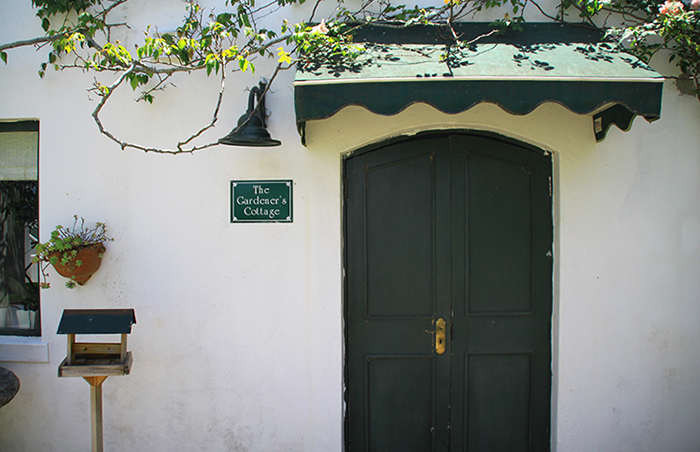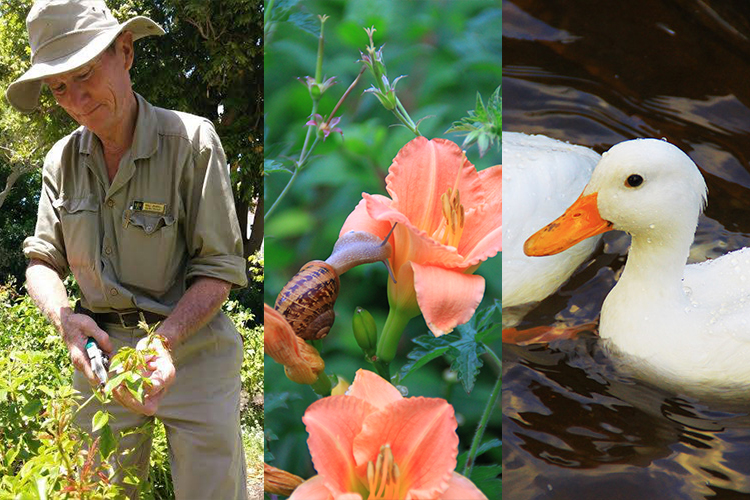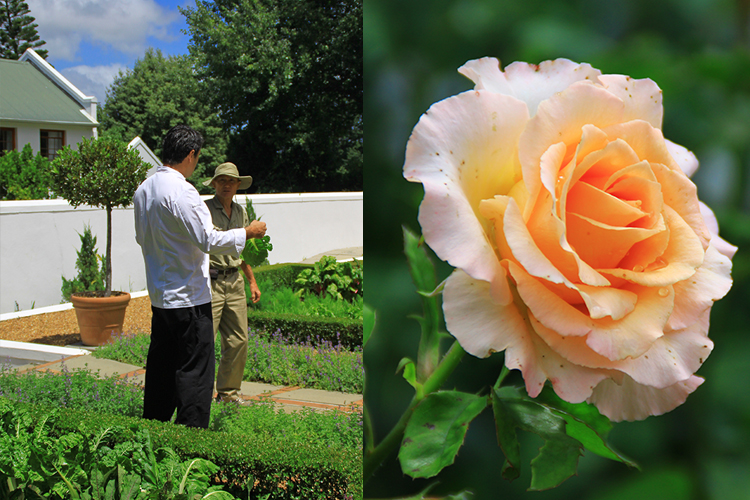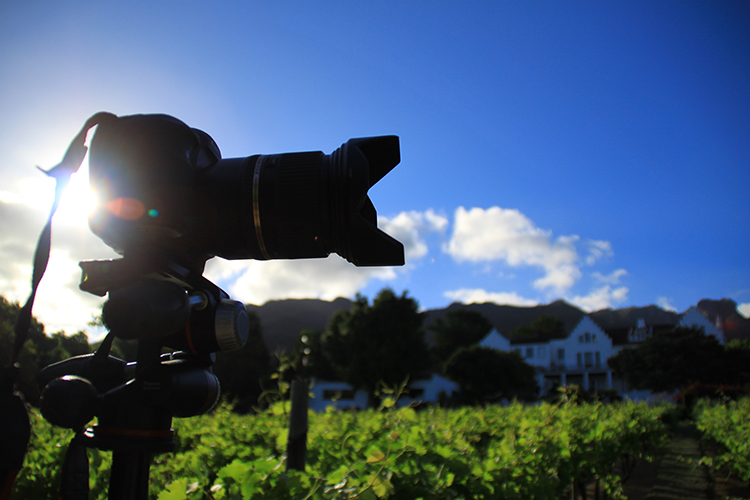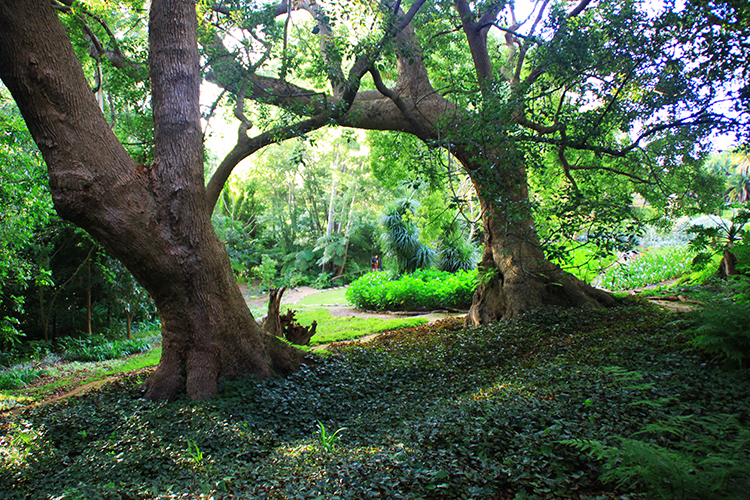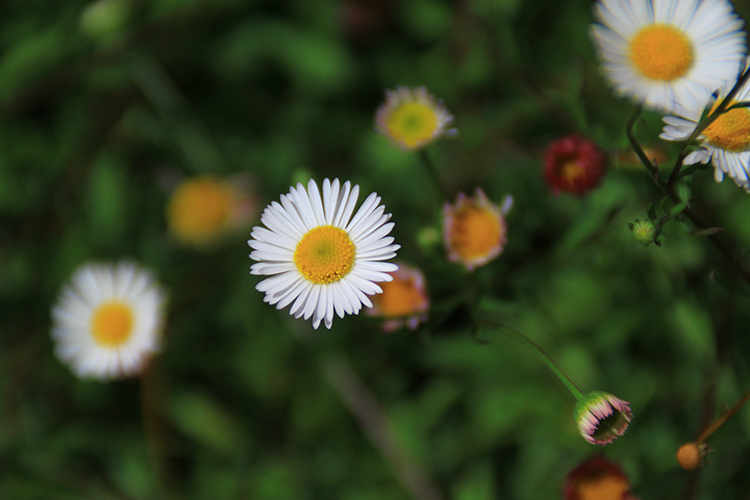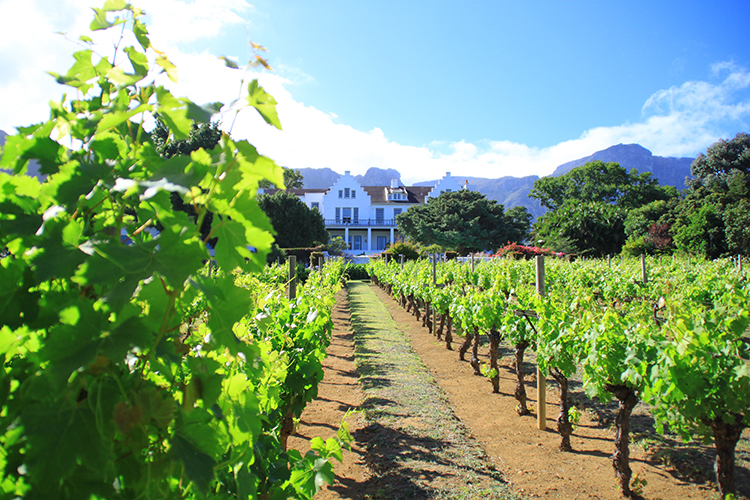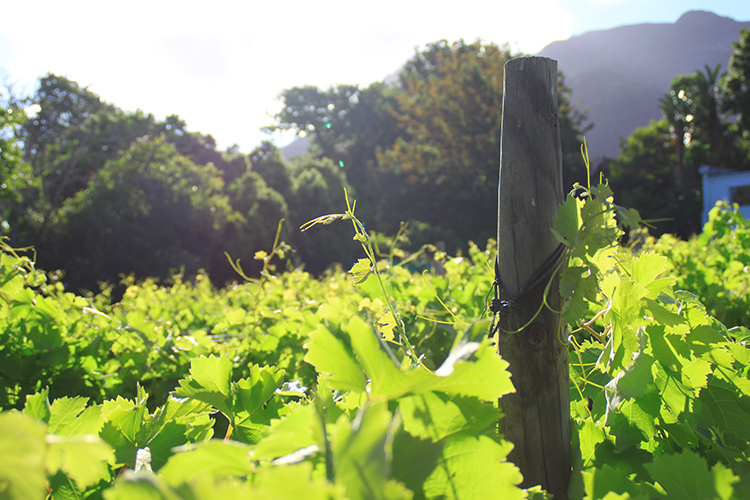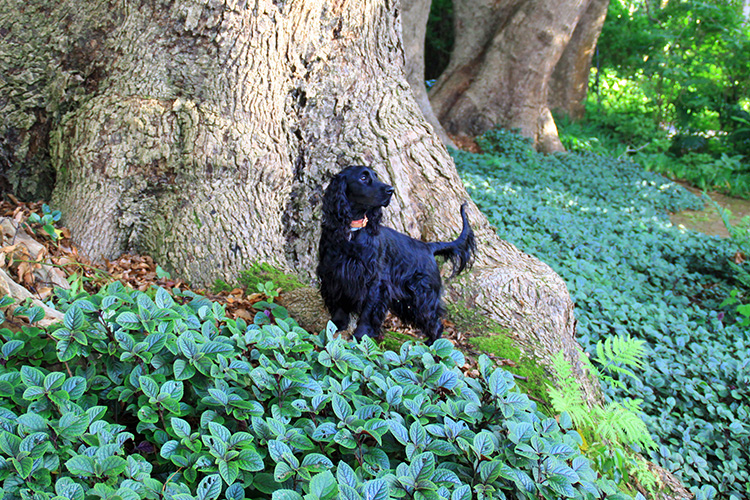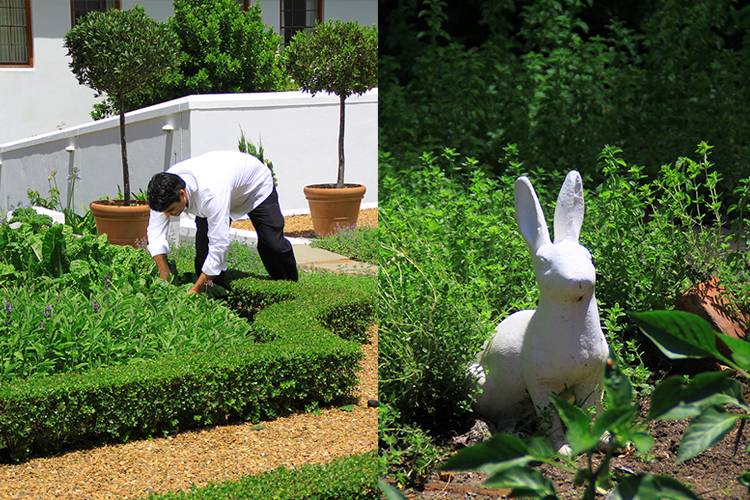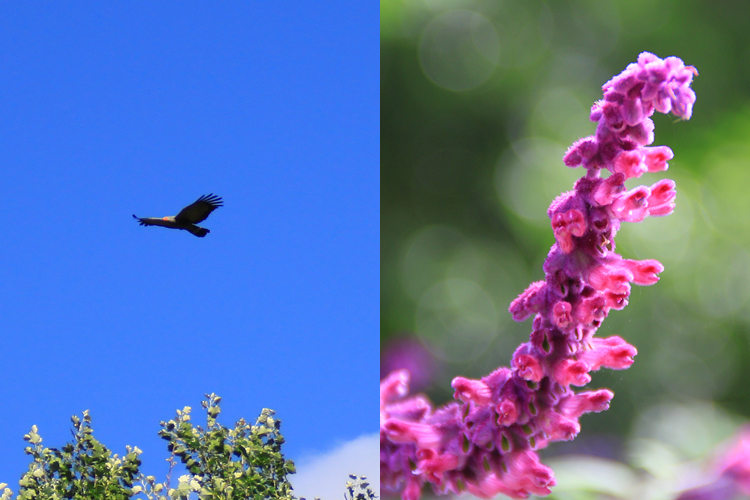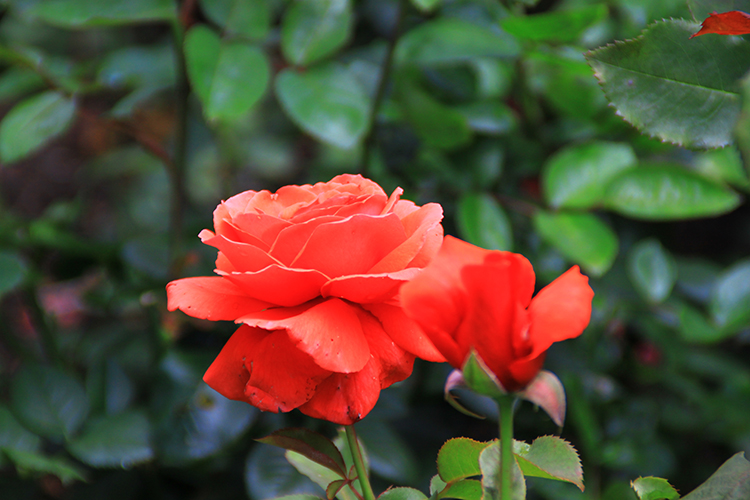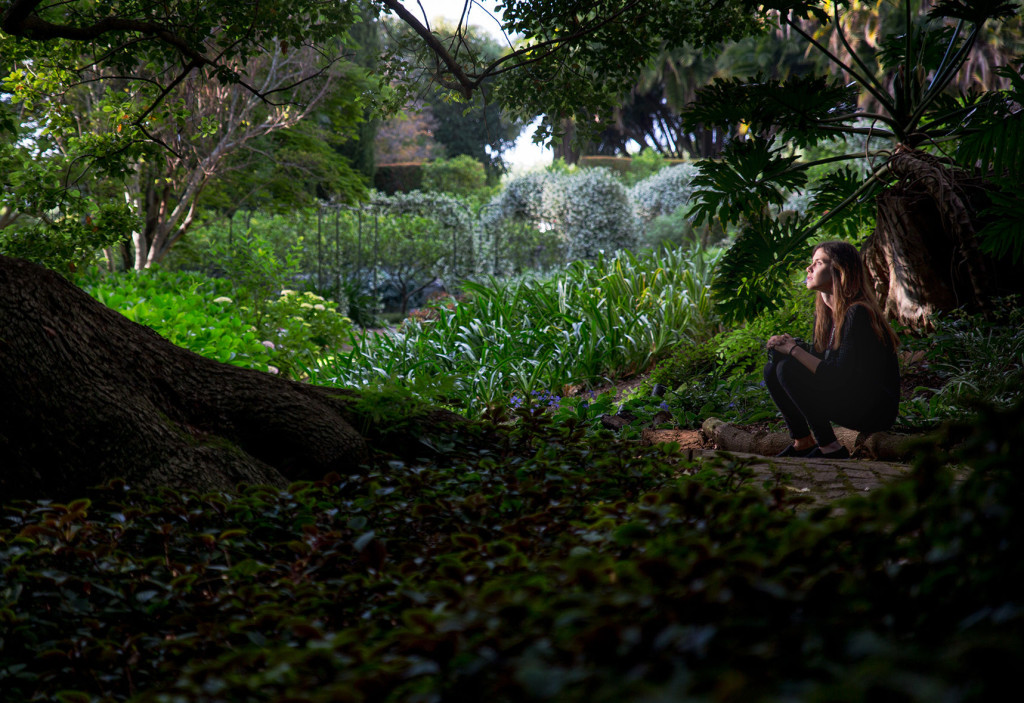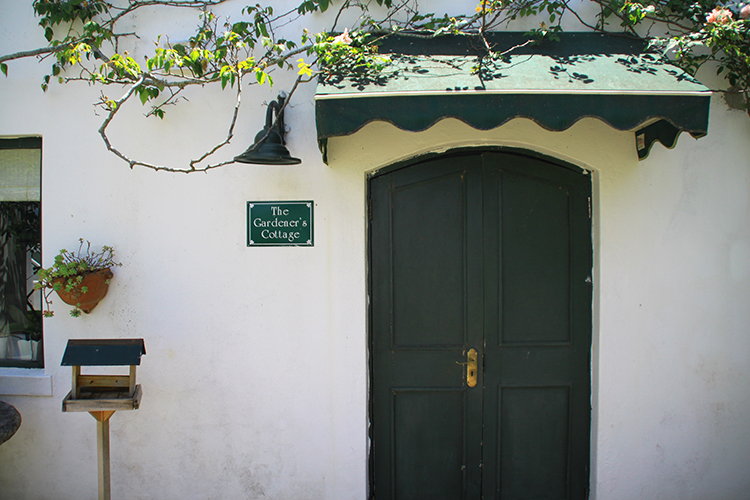
“If you look the right way, you can see that the whole world is a garden.” – Frances Hodgson Burnett
They say gardeners know all the dirt… As such, we had to take a glimpse into the mind of one of our favourite gardeners, Niall Mc Krill, Garden Manager of The Collection by Liz McGrath’s The Cellars-Hohenort in Cape Town, a sort of oracle of nature, a man who takes the art of gardening and turns it into a profound lesson for living.
Above: Niall with The Collection’s Executive Chef, Peter Tempelhoff
Like Niall himself, the 9,5 acre gardens of The Cellars-Hohenort are a muse to the chefs of the estate’s restaurants, both The Conservatory and The Greenhouse; to the guests who wind through it or wind down in it, under the canopy of trees dating back to Simon van der Stel’s time or with the ducklings beside the pond; and to the photographers, whose lenses focus in on the beauty of life’s little things in the rose garden or the vineyards beside the pool.
Widely regarded as one of the finest privately owned gardens in the world, it is as much a work of art as they are a hermitage in the middle of a city and was awarded the prestigious Relais & Châteaux Garden Award in 2010.
See gardening with new eyes in our Q&A with Niall below.

10 Questions with Niall McKrill
1. Five important things to remember when it comes to gardening?
- Remember to do things with meaning and passion.
- Set achievable and realistic goals in sections. Use all the areas and features that you have to make them work.
- Feed and water well.
- Enjoy your work. It’s pointless having to endure it.
- Don’t ever wish to have nails that look like a fashion models, unless you are cheating!
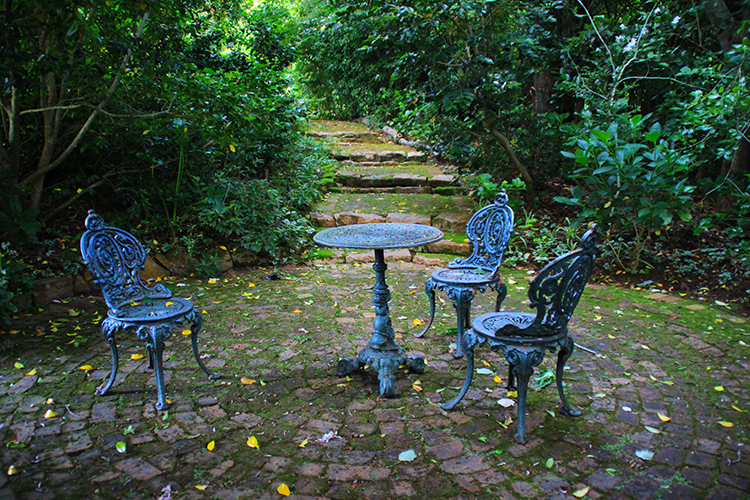
2. Five things gardening has taught you about yourself, life and love?
- As is life, we only pass this way once, make the best of it.
- I love my job! It has a calming effect on my life, having had some pretty hectic parts to it.
- Gardening is a great leveller, and, as with most good things, it takes time to happen. Make things happen, don’t just watch them happen, or wonder what happened!
- Share ideas. It is an easy way to make real friends.
- My wife is an avid gardener so we share the same passion for it. We have a simple English style garden at home, which is calming to work in.

3. Let’s shed light on your background. Complete the sentence: Everything I know about gardens, I learnt from…
My mum in Rhodesia/Zimbabwe, was a great gardener, and we had about 3 acres there, with many fruit and veggies growing, and were pretty much self sufficient. We used to have hoya carnosa, roses and carnations growing and I remember her selling them to the florist shops in Salisbury. My dad was a great cacti and succulent person too. We had a magnificent succulent section, many of which he propagated from seeds in the little greenhouse he and I made.
How did your role as Head Gardener come about?
I had been coming to The Cellars-Hohenort for many years, with my wife, who is the in-house florist. I got involved in the vineyard and with helping with the garden shows over the years, and then when the garden manager of the time was leaving, Mrs M (Liz McGrath, the late Proprietor of The Collection by Liz McGrath), offered me the job.
I have always had a passion for gardening and enjoy the open-air office, of which I have about 9 acres now. The job seems to change by the hour, bringing with it challenges and rewards, rather like bringing up children.
4. During your time at The Cellars-Hohenort, how have you seen the garden change – both at your hand and the hand of nature? And what new changes can we look forward to in the future?
The garden is undergoing subtle changes. The character should always stay the same, but subtle changes spark interest – our guests take great delight in looking for them and often comment on the things they have noticed since their last visit, or on the seeds and cuttings they have taken.
Currently we are working on the pond area near the rustic garden and the red garden. These projects are driven by Jean and involves the whole team aligning the ponds and removing plants and replanting them elsewhere suitable to their colour and suitability to their new environment. We have made some changes to the herb garden, and have added some medicinal as well as the usual culinary herbs to it. It should be interesting this summer. We have chipped a lot of the larger wood pieces and intend to place them in the dell area on the pathways, and are about to start re-gravelling the car park area and some of the pathways.
Many of the trees have really grown over the last few years, which has caused some new challenges to the rose garden and putting green, so some pretty serious trimming was needed, like four metres off the top of the Eugenia trees above the rose garden, to give the roses more sun and a better display. We have to consistently spray the golf green to keep the black moss under control, as the trees above this area have also grown phenomenally, and shield the sun for much longer now than before.
5. Favourite part about the job?
The job is never boring! I believe that if you love and have passion for your job, it is a far more rewarding one than having to do it because it is a task. Meeting people and discussing problems and areas of concern with them is always interesting. It’s great to get to share ideas and achievements. I love the garden tours and have made some very special friendships through these.
6. What is the role of the garden in the cuisine at The Cellars-Hohenort’s restaurants, The Conservatory and The Greenhouse?
It is a mutual friendship, as the volumes they use would take up more that we could produce, on a regular basis, but we do have some of the top items here, which are harvested regularly. I assist with foraging and have some of the top items that they use growing, such as carrot tops, dill, flatleaf parsley, peas and kale to name a few.
7. Favourite uniquely South African plants/herbs/vegetables to grow and why?
We have tried to retain as much of the indigenous products as we can, and have some famous champion trees now- the camphors, which were checked and certified earlier this year. The second oldest in South Africa. Our roses, hydrangeas and plectranthus are always a show, but do need consistent work, feeding and checking for pests and disease.
The selection of vegetables is done on a rotational basis so one season we have above ground products and the next year we have below ground ones in their places. We use as much of our own compost mixtures as we can.
8. The Cellars-Hohenort is well known for its roses. What is the secret to growing roses and what is it about this one flower, do you think, that has captivated people throughout history more than others?
Our roses, approximately 2000 units now, all over the property, are known for their show, scent and beauty, but they need feeding and tender care. Feeding in the early spring is good, so that when the plants wake up from their winter slumber, they will have absorbed some of the nutrition. It gives them a much better start to the new season. After the prune in late July and the first week or so of August, we spray with lime sulphur, to eradicate, or stop fungus and other problems that might have been lurking in the ground over the winter period, and again about 10 days later, before the new shoots or leaves have begun to form. Roses respond to feeding, watering, dead heading, deep watering and good mulching early in the season, and light pre-winter pruning and the big winter prune.
People have probably been captivated by roses because of the varieties and joy of both being given the cut blooms, and growing them themselves. Roses have been written about for many years, both in times of happiness and sadness, and will be written about for many more years I am sure.
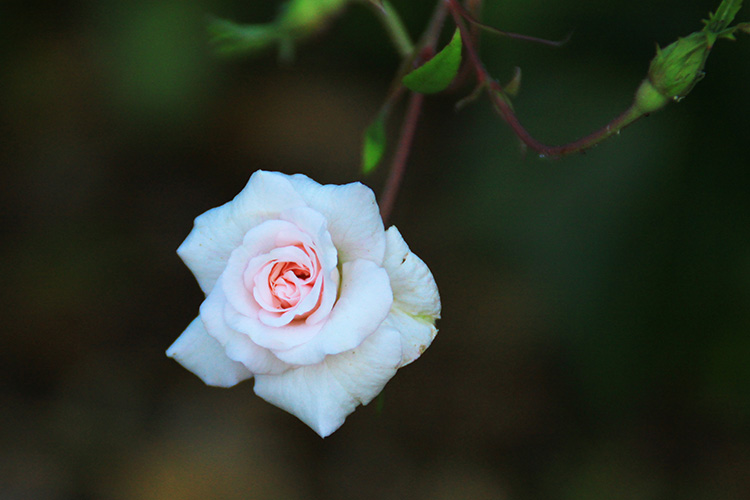
9. Managing 9 acres of garden is not a job for one man. Tell us about the team working with you…
The team consists of people who are passionate about gardens and their environment, not just about doing a job. Jean has been here for many years and was instrumental in setting up the gardens with Mrs M many years ago. The team has about five people and a student, who is with us as part of their horticultural diploma. The men have about two acres each – there are nearly two rugby fields of turf, a putting green, about 2000 roses, nearly 1000 vines, and many hydrangeas and plectranthus, as well as the dell, and rustic garden apart from the nearly 2.5 kms of hedges that need frequent trimming. So we are kept reasonably busy.
Apart from the winter leaf fall, which I recon we must clean up about 4 or 5 tons a season, some to compost, and others not. This is where the team works together or else we would never be able to achieve what we have to do.
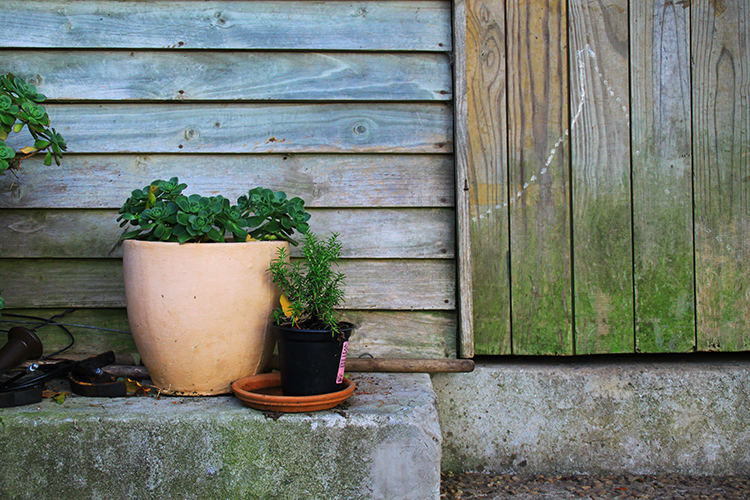
10. The Cellars-Hohenort garden is full of secret lanes and nooks, ponds and towering trees, ducks and porcupines, vineyards and veggie gardens… In your mind, what is it about this inner-city garden that makes it so special/unique?
I believe the whole experience is what makes it interesting, with different types of zones on the property. The soils are clay, sandy, soft and fertile, and each area has unique properties that enhance the plants they contain. The livestock on the property is also somewhat unique, with the friendly porcupine that comes in from the green belt, just when the bulbs and arums are about to flower. She snacks on them and after a weekend, she has destroyed just about all our arums, even though we have planted an area just for her. But that is nature. We try to outwit each other. If we find the hole under the fence she’s scurried through, we “fix” it, but she manages to find another, and so it goes.
We have a couple colonies of chameleons here too. They are very territorial, and can be found every season in or around the same area. They all have unique ID markings or dots on them. I have a log book and tracked some for a while. Some snakes visit too and in Spring we have the small and harmless slug eaters and brown house snakes, all of which contribute to the eradication of slugs, snails and garden pests.
Guests come here because it reminds them of a country home where they feel part of the place, and not like they’re actually at a hotel.
Discover more in Niall’s Corner on The Collection’s Blog: Niall’s top tips for growing roses, and How to attract bees to your garden.
